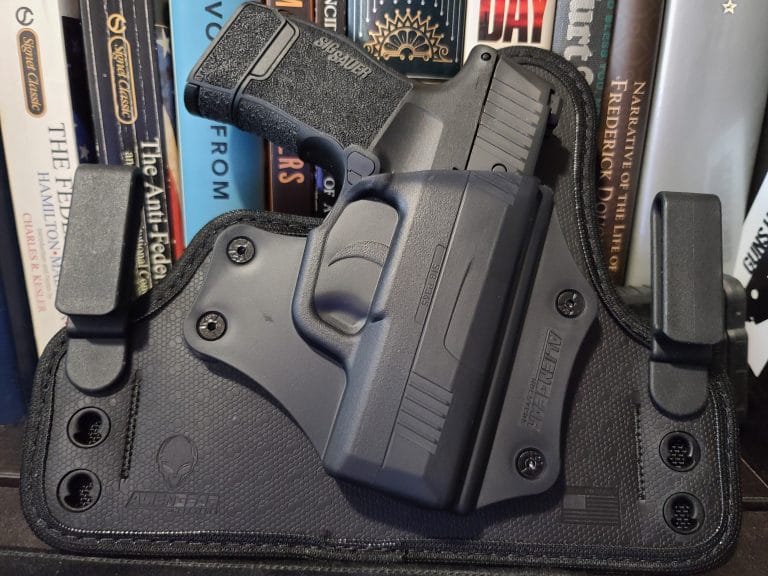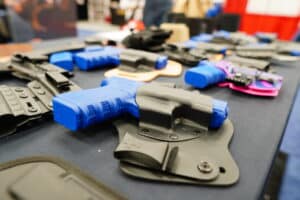New York has a particularly restrictive gun-carry law, and there’s good reason to believe the Supreme Court is about to strike it down after what the justices said in last week’s oral arguments.
First off, the fact that the Court took this case at all gives some indication they plan to overrule the lower court’s decision to uphold the law. While certainly not impossible, the Court rarely grants an appeal in a case like this one only to uphold the decision being appealed. Then you have the makeup of the Court, which most observers believe is somewhere between a 6-3 and 5-4 divide on expanding Second Amendment protections with Chief Justice John Roberts as the swing vote.
Then, of course, you have what the justices said during oral arguments. Roberts, Neil Gorsuch, Bret Kavanaugh, Samuel Alito, Amy Coney Barret, and Clarence Thomas all asked more critical questions of the law than of the case against it. Though, as is usually the case, their inquires weren’t entirely in one direction.
None of these things are foolproof indicators. The Court isn’t always as predictable as it may seem. Some experts have argued it may strike down New York’s law or could do so in a way that doesn’t create much of a precedent.
But, what exactly would it look like if they do strike it down?
Well, for one, a specific alternative to New York’s restrictive “may-issue” gun-carry law popped up repeatedly during oral arguments on Wednesday: “shall-issue” permits. The main difference between the two regimes is that, while a license is still required, under “shall-issue,” the discretion of government officials in issuing permits is significantly reduced.
Under “shall-issue” regimes, if somebody passes a background check and completes the required training, they must be given a permit. Under “may-issue” regimes, those same people could be denied if the official responsible for issuing the permit decided they don’t have a “good reason” to need a license.
How can a state justify giving government officials subjective discretion over citizens’ exercise of a constitutional right? That was the main thrust of questioning by several Supreme Court justices.
Kavanaugh specifically framed the core question of the case as “a narrow legal issue of ‘shall issue’ versus ‘may issue.'” He pressed New York on why it couldn’t adopt a “shall issue” regime the way 43 other localities have.
“It seems like before you impose more restrictions on individual citizens and infringe their constitutional rights, based on this theory, you should have to show, ‘well, in those other states that have shall issue regimes, actually there is a lot more accidents, crime,'” he said. “And I don’t see any real evidence of that.”
Roberts went a bit further and questioned the entire idea of requiring permitting when a constitutional right is implicated.
“Regardless of what the right is, it would be surprising to have it depend upon a permit system,” he said. “You can say that the right is limited in a particular way, just as First Amendment rights are limited, but the idea that you need a license to exercise the right, I think, is unusual in the context of the Bill of Rights.”
However, he retreated to the basic idea of a “shall issue” permit while elaborating.
“There’s licensing, and there’s licensing,” he said. “Maybe it’s one thing to say we need to check, make sure you don’t have a criminal record, make sure that all the other things you can check on, but not that we assume you don’t have a right to exercise your, It’s hard to say it without saying it, exercise your right under the Second Amendment, and you’ve got to show us that you do.”
The law’s defenders argued the history of “may issue” laws dating back to the 19th century makes them presumptively compatible with the Second Amendment. Plus, they warned moving to a “shall issue” would lead to more violence in a populous state such as New York. Justice Breyer argued if people were allowed to carry a gun purely for generic self-defense concerns, it would lead to people shooting each other more often.
“Is it supposed to say you can carry a concealed gun around the streets or the town or outside just for fun? I mean, they are dangerous, guns,” Breyer said. “The difference, of course, you have a concealed weapon to go hunting. You’re out with an intent to shoot, say, a deer or a rabbit, which has its problems. But, here, when you have a self-defense… just for whatever you want to carry a concealed weapon, you go shooting it around, and somebody gets killed.”
Paul Clement, the plaintiffs’ lawyer, responded they weren’t asking for anything other than the same kind of laws that most of the country has successfully operated under for decades or even centuries.
“With respect, Justice Breyer, that’s not been the experience in the 43 jurisdictions that allow their citizens to have the same rights that my clients are looking for,” he said. “This is not something where we’re asking you to take some brave new experiment that no jurisdiction in Anglo-American history have ever done. We’d like what they’re having. We’d like what the people in the other 43 states are allowed to do and exercise their rights, and in many of those states, it’s shall issue.”
If “shall issue” is the ultimate winner in this case, what does that mean in practice?
Well, there are only currently eight states left with “may issue” regimes. However, they include populous states such as New York, New Jersey, Massachusetts, and California. That means about 25 percent of the country currently lives under a “may issue” regime and would be far more likely to obtain a concealed carry permit under a Court-ordered “shall issue” regime.
However, it may not be the kind of gun-rights paradise (or nightmare scape depending on your point of view) some envision. Washington, D.C. serves as a great example of how things could go in these eight states where voters prefer strict gun laws.
After federal judges struck down its total ban on gun carry, D.C. passed a “may issue” law and denied nearly all applications. Then, that law was struck down as well, and D.C. was forced to adopt a “shall issue” law. It did just that, but with a few catches.
Unlike its neighbor Virginia, which requires just a background check and widely-available NRA gun safety training, D.C. created unique training requirements and a trainer certification process. The 16-hour course costs several hundred dollars on top of the $110 in application and fingerprinting fees. It also has to be renewed every two years, compared to five in most states.
Plus, the law creates hundreds of gun-free zones dotting the city. And it bans carry on all public transit.
Add in the regular processing delays, and you get a situation where obtaining a permit is practically limited only to people who have the time and money to jump through all the hoops successfully. That’s likely why the city has only issued a few thousand.
What D.C. has done will serve as the playbook for states forced to adopt a “shall issue” law. And, don’t expect them to recognize permits from any other states either. D.C. hasn’t and, even though the city was forced to issue licenses to non-residents, the lack of reciprocity has kept the number of people who can legally carry in the nation’s capital relatively limited.
Still, even with all of that in mind, a ruling setting “shall issue” as the new standard for gun-carry laws means millions and millions more Americans will probably become gun carriers.







4 Responses
The real problem is restrictions on where we can carry. Do you think the court will set a standard by which jurisdictions may not restrict where people can carry? Taken to it’s logical conclusion, jurisdictions could effectively shut down concealed carry to the sidewalk in front of your house and nowhere else.
I doubt the Court is going to address local carry restrictions beyond saying that some are generally permissible. I think they’ll probably wait for future litigation to set the lines on what’s an acceptable restriction and what’s not. Right now, I think they’re only concerned with setting permitting standards and maybe a legal standard for how to judge future gun cases.
Thanks. What about reversing local gun control in Virginia with the new GOP leadership? Any chance there?
I think it will be an uphill battle for them to repeal the local gun-free zones since Democrats still control the Senate. However, it’s certainly not impossible. Especially as part of a larger deal.